- Home
- Vince Flynn
Separation of Power Page 10
Separation of Power Read online
Page 10
Kennedy entered the West Wing on the ground floor. She was dressed in a conservative but stylish dark blue suit. Under her arm she carried a locked pouch containing the President's daily brief, or PDB, as it was known by all in the national security community. The brief was essentially a daily newspaper put together by the CIA's top analysts. It was a highly classified document and was distributed to only the most senior people in an administration. Each copy was collected at the end of the day and destroyed. Normally someone junior to the director of the CIA delivered the brief, but Kennedy had decided to handle it herself this morning.
She made her way up to the first floor and into the President's private dining room off the Oval Office. President Hayes was waiting for her, an array of newspapers spread out on each side of his place setting, a bowl of Grape-nuts in the middle and a piping hot cup of coffee on his right. Hayes was a very organized and determined man. He had told Kennedy recently that he wasn't going to let the job destroy his health like it had his predecessors'. He spent thirty minutes on the treadmill and bike four to five days a week. In fact, this was when he normally reviewed the PDB. This morning, however, he had scheduled several early meetings. The situation in Iraq had him on edge. When they were done with their coffee they were to head down to the Situation Room to receive a briefing from General Flood and his staff.
Thus far, Kennedy had talked Hayes into keeping the amount of people involved in the crisis to a bare minimum. The secretary of defense was in Colombia until Saturday. He would be briefed when he returned. The Joint Chiefs and the secretaries of the various services were to be kept in the dark until the last minute and the remaining members of the Cabinet, with the exception of Michael Haik, were also to be left out of the loop. Kennedy had convinced the President that the last thing they wanted to do was give Saddam a heads-up that something might be coming his way.
The President didn't bother to look up from whatever paper he was reading when Kennedy entered the room. "Good morning, Irene. Have a seat. Would you like anything to eat?"
"No thank you, sir. Coffee's fine." Kennedy poured herself of cup from the sterling silver pot sitting in the middle of the table. These early morning meetings with the President in the small dining room were becoming a weekly event. Kennedy was starting to feel very comfortable in her dealings with the man.
"What's new today?" Hayes shoved a spoonful of the tiny brown rocklike cereal into his mouth.
"Well," Kennedy extracted a key from her jacket and started to open the pouch. " Pakistan is making threats again to launch another offensive to take back the disputed land with India "
The President waved his hands in the air and then wiped a drop of milk from his lip. With his napkin still in hand, he said, "Put the brief away. I'll look at it later. Unless there's something that needs my immediate attention, I'd like to talk about this mess your Israeli friend has dumped in our laps."
Kennedy briefly wondered if the use of the word friend was more than a random selection. It was apparent that the looming crisis with Iraq had the President upset. "What would you like to know, sir?" Hayes set his napkin down and pushed his cereal out of the way. He took a second to rearrange the things in front of him while he organized his thoughts. "I want to throw something at you, and I want you to keep an open mind." Hayes made direct eye contact and added, "I want you to give me your
honest answer."
Kennedy kept her expression neutral, her brown eyes locked on the Presidents. She nodded for him to continue.
"Can we trust the Israelis on this thing?"
Kennedy instantly disliked the question. It was fraught with problems, too broad to give a well-crafted answer. "Could you be a little more specific, sir?"
"This information they've given us, can we trust it? Is it possible they have it wrong or that they've been fed this information by the Iraqis?"
She thought about the question for a moment and answered, "As you know, sir, anything is possible, but I think this information is pretty accurate."
Hayes grimaced. He wanted a more concrete answer than what she'd just given him. "What makes you say that? Is it because you trust Colonel Freidman?"
Kennedy got her first hint of what might be bothering the President. "I trust Ben Freidman, sir, but only so far. I know better than anyone where his loyalties lie. He does nothing unless it helps Israel."
"That's what worries me. I don't like being manipulated by any country, but I especially don't like it by a country that owes us its very existence. Quite a few of my predecessors allowed Israel to lead them around by the nose, and several of them weren't even aware of it. Not me." Hayes angrily shook his head. "I won't allow it. I want to make damn sure this information is correct before we start dropping bombs. Do we have anyone in Baghdad who can confirm what Freidman told us?"
"This is awkward, sir." Kennedy hesitated for a second. "Our resources in Iraq are limited. As you know, we have a few people in the regime who are on our payroll, but to ask them to look into this would be extremely risky." "Isn't that their job?" asked the President with a hint of irritation in his voice. "Isn't that what we pay them to do?"
"Yes," Kennedy conceded, "but for them to go outside their area of concern and start asking questions " her voice trailed off and she uncharacteristically grimaced. "It would almost certainly get them tortured by Saddam's secret police."
The President was undeterred. "Well, listen, before we start dropping bombs on a hospital I'd like to be absolutely sure that those nukes are in fact there."
"Sir, I can ask one of them to look into it, but I think they will ignore me. It's too risky. Besides, we have no reason to doubt the Israelis on this."
"I can think of several reasons why I should doubt them." Hayes rolled his eyes.
Kennedy ignored the comment and extracted a file from the pouch. "I thought you might be interested in these." She slid a sheaf of black and-white satellite photographs across the table. They were of downtown Baghdad. The Al Hussein Hospital was circled in white. "I had my people go back through the files to see what they could dig up on the hospital. This is what they found." Kennedy removed the first photo, revealing a second one that showed just the hospital and the surrounding one-block radius. On the east side of the hospital, where the alley was located, several vehicles were bracketed in white and next to them were two simple words: Dump Truck.
"This all started a little over three years ago. Dump trucks all day long for a month straight. My experts estimate that over a thousand tons of earth was removed from beneath the hospital." Kennedy flipped to the next photo. It was the same setup, except this time the vehicles in the alley were labeled as cement trucks.
"My people counted the number of trucks that came to the site and feel pretty confident that they weren't just laying a new foundation. They say the only time the Iraqis use this much cement is when they are trying to build a bunker."
"How in the hell did we miss this?" Hayes asked angrily. "Isn't this why we spend billions on the spy satellites?"
"The problem, sir, is that we leveled a good portion of the country. Since the end of the Gulf War it's been a nonstop succession of dump trucks and cement trucks."
The President flipped through the remainder of the photographs without comment. When he was finished he took his time putting them back in a neat stack and then handed them to Kennedy. "You think this corroborates what Freidman told us?"
"Yes, I do."
The President stood and walked over to the window. He gazed across the way at the Executive Office Building. Kennedy watched him in silence, speculating if he wasn't telling her something. She was in the midst of wondering if the Israelis had done something she didn't know about, when the President turned around and spoke.
"How many people are in this hospital?"
"I'm not sure, sir." Her answer was less than truthful. One other analysts had given her a range, but she didn't think now was the time to tell the President the number.
"Hundreds?"
> "Possibly"
The President turned around again and looked out the window. Kennedy felt for him. It would probably be aviators who would drop the bombs, but they were trained from day one of flight school to deal with it. Not the President. He was ultimately the one who would be ordering those people to their deaths. Kennedy feared that he was going through the hospital wondering how many children would be killed, how many mothers, fathers and grandparents. It was an ugly business they were in.
Without looking away from the window, the President shook his head and said, "You know, right now I really hate the Israelis for putting me in this position."
Kennedy frowned at the President's words. Emboldened by a career of making difficult decisions she said, "You don't mean that, Mr. President. "When Hayes turned around she said, "The Israelis didn't put this facility under a hospital. Saddam did. He is the one who has put those people in harms way. He's the one who's put us in this position."
CHAPTER ELEVEN.
Situation room, Wednesday morning
General Flood was traveling light, so as not to attract too much attention. He'd brought along only four aides, one each from the air force, the navy, the marines and the army. When the President and Kennedy entered the Situation Room, the five military men were arrayed around the far side of the table. Simultaneously, the warriors snapped to their feet.
"Good morning, gentlemen. Please be seated. "The President pulled out his leather chair at the head of the table and sat.
Michael Haik, the President's national security advisor, arrived on their heels. He and Kennedy sat next to the President. The President's chief of staff had not been invited to the meeting, and General Flood was very appreciative. He didn't want the President to be distracted by Valerie Jones inserting political issues into the meeting. The task at hand was to apprise Hayes of his military options and give him a realistic estimate of the time it would take to move the right assets into position.
General Flood was seated opposite the President at the far end of the table. He was an imposing man at six feet four and almost 300 pounds. Flood leaned forward, placed his forearms on the table and started. "Mr. President, as you have requested, my staff and I have prepared several contingencies for you. The first plan is one you are familiar with. Within minutes of you giving us authorization, we could launch a salvo of Tomahawk cruise missiles that would level the target. This plan has only one redeeming quality in my opinion. It guarantees us that we won't lose any air crews." Flood paused briefly. "We are also of the opinion that a strike with Tomahawks would not guarantee the destruction of the primary target."
The President wasn't sure what the general meant, so he asked, "Please elaborate?"
"Dr. Kennedy has provided us with satellite imagery that suggests a command- and control-type structure was created underneath the hospital. Tomahawks don't work. against these types of hardened targets. We would merely level the hospital and incur some collateral damage."
"General," growled the President with a look of disapproval on his face.
"I'm sorry, sir," apologized the general, who had momentarily forgotten the President's severe dislike of sterile military terms. "We would merely level the hospital and kill most, if not all, of the people inside. We would, of course, also run the risk of an errant Tomahawk hitting something other than the target, but depending on how many missiles we use in the attack the chances of that happening is somewhere in the neighborhood of five to ten percent."
"What's the next option?"
"The next one involves using F-117A stealth fighters from the 48th Fighter Wing out of Holloman Air Force Base in New Mexico. These platforms would give us maximum stealth and the ability to deliver precision-guided munitions to the target. Our odds for success in taking out the nukes are much better, but still somewhat limited." "How so?" asked the President.
"To go after a hardened target like this we need to use penetration bombs. The weapons bays of the F-117's are limited as to the size of the bombs they can carry. The largest penetration bomb they can deliver is the GBU-27/B. It's a good weapon, and in most cases I think it would suffice, but with this strike, sir," Flood adopted an uneasy tone, "I'm afraid we're only going to get one chance to take these things out"
The President nodded. "I share your concerns, and agree that we are only going to get one chance at this. If we send in the stealth fighters, what are our odds for success?"
^ -General Flood looked first to his left and then to his right. "We have some disagreement on what the number might be. "The general nodded to a man in a dark blue air force uniform.
"Mr. President, I'm Colonel Anderson. It is my opinion that a flight of four F-117's, each one armed with two of the twenty-one hundred pound GBU-27/B laser-guided paveway bombs, would be more than enough to destroy this target."
"So you're talking eight bombs."
"That's correct, sir."
"And you're confident that the nuclear devices will be destroyed."
"I am, sir. This is the weapon we used on many of the hard targets during the Gulf War, such as aircraft shelters and command and control centers."
"How confident?"
The colonel thought about it for a moment and replied, "Ninety percent, sir."
The President wasn't sure he liked the answer. He noticed that one of the generals other aides was frowning in such a way that it was obvious he disagreed with his fellow warrior. The man was a marine, and Hayes noted the birds adorning his epaulets. He looked the officer in the eye and said, "Colonel, you seem to be in disagreement."
Without hesitation the marine replied, "Yes, I am, sir."
"What's the problem with Colonel Andersen's plan?"
The marine looked across the table at his friend and said, "I have a lot of respect for Colonel Anderson, but we are in disagreement as to what would be the more effective plan of action here. I don't feel that a ninety percent success rate on this mission will cut it. If the stealth fighters don't succeed in penetrating the bunker beneath the hospital all they will do is add a layer of rubble to the top of it, making the target even harder to penetrate if we need to conduct follow-up strikes."
"Then what do you suggest?"
"Are you familiar with Deep Throat, sir?"
The President was a little miffed by the question. The first thought that entered his mind was Watergate, quickly followed by the porno movie of the same title. He decided it was best to say nothing, and simply shook his head.
"Deep Throat, sir, is the name for our super penetrator bomb, the GBU-28/B. Colonel Anderson is correct that the GBU-27/B was very successful against hardened airplane shelters and other low-level command and control centers, but it should be noted that the weapon was absolutely ineffective against Saddam's big command and control centers." The marine looked briefly at General Flood and then continued. "During the war the CIA located what they thought was Saddam's main command bunker. It was at the al-Taji Airbase about twenty miles outside of Baghdad. Early in the air war we launched three separate sorties with F-117's carrying GBU-27/B laser-guided penetration bombs. We dropped over twenty bombs on the target, sir, and we barely put a dent in it."
The F-117 strike was sounding less appealing by the minute to the President.
"We realized that if we ever wanted to get at Saddam and his generals we would need a bomb that could penetrate these superbunkers. The air force's Air Armament Division was asked to find a solution, and do it quickly. In record time they came up with Deep Throat, a forty-seven hundred-pound behemoth that was twice as long and twice as heavy as any other penetration bomb in our arsenal. It was so big, in fact, that the stealth fighter couldn't carry it. The bomb was designated the GBU28/B. On the last night of the war, sir, two F-111's took off from the Royal Saudi Air Force Base at Taif. They each carried one GBU-28/B. The bombs were dropped from high altitude. One missed, and the other scored a direct hit"
"What were the results?"
"All five of the bunker's blast doors were blown off
their hinges, sir. From the inside out." The marine paused to let the President think about the destructive force. "The target was obliterated."
"Who was in the bunker?"
"Dr. Kennedy can answer that question better than I can, sir."
"Irene?"
"At least a dozen of his top generals, some of Saddam's family members and a number of high-ranking politicians."
The President momentarily reflected on how much easier his life would be if Saddam had been in the bunker on that night. Unfortunately, he wasn't. "What would a bomb of this magnitude do to the hospital?"
"It would completely level it, sir," answered the marine.
"What about the surrounding buildings?"
"The collateral damage-" the marine caught himself and said, "If we hit the target, the number of people killed in the surrounding buildings would be minimal."
"And if we miss?"
"Whatever this bomb hits, sir, it will destroy."
Hayes thought of the finality of such a statement and then said, "Taking into account the very real potential of missing the target, what are the odds for success if we use Deep Throat?"
"One hundred percent, sir. We can stack the sorties and bring them in two planes at a time at whatever staggered intervals are deemed appropriate. The targeting pods on the F-111's can give us real time imagery. We'll know within seconds if the first sortie was successful or not. If it fails, we green light the second one and so on until we get it right."
The President brought his left hand up and scratched his chin while he thought about these super bombs raining down on innocent civilians. He pushed the image from his mind and asked the obvious question. "Why would I go with the stealth fighters if at best you can only give me a ninety percent success rate?"
General Flood fielded the question. "If we use the stealth fighters, sir, and the smaller penetrating bombs, it is a relatively simple, low-risk operation. The number of assets involved is very manageable. The stealth fighters can get in, drop their bombs and be on their way out before the shooting starts. If we decide to use Deep Throat it changes the scope of the operation significantly. The F-111 is the most stable platform we have that is capable of carrying Deep Throat. As you know, the F-111 is not a stealth aircraft. That means we would have to launch a major attack against Iraqi radar and SAM installations to make sure we don't lose one of the planes. An attack of this nature would involve navy and marine F-18's operating off the USS Independence in the Gulf, cruise missiles launched from the battle group, air force units operating out of Saudi Arabia and Turkey, and it would also likely involve some units from the Joint Special Operations Command."

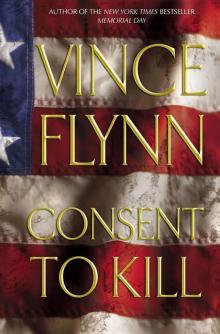 Consent to Kill
Consent to Kill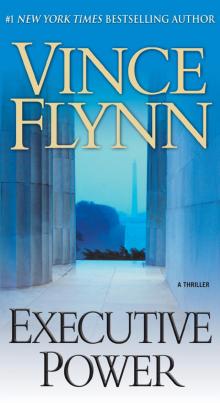 Executive Power
Executive Power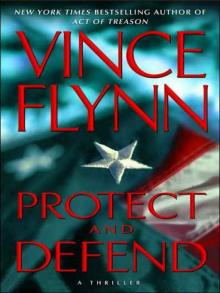 Protect and Defend
Protect and Defend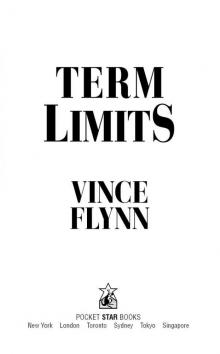 Term Limits
Term Limits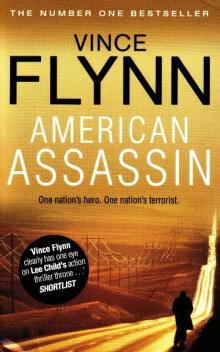 American Assassin
American Assassin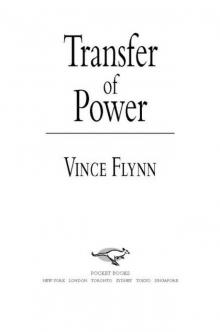 Transfer of Power
Transfer of Power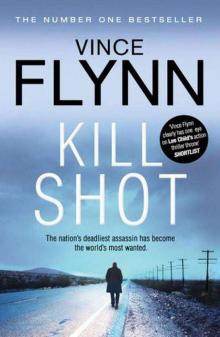 Kill Shot
Kill Shot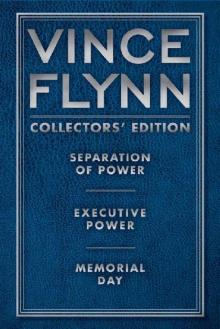 Vince Flynn Collectors' Edition 2
Vince Flynn Collectors' Edition 2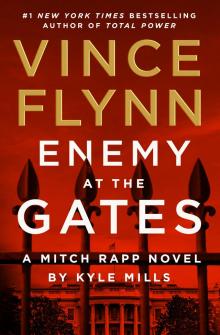 Enemy at the Gates
Enemy at the Gates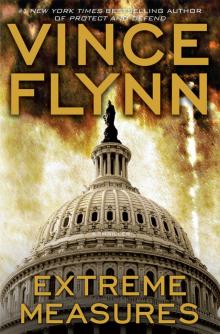 Extreme Measures
Extreme Measures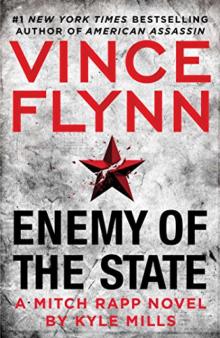 Enemy of the State
Enemy of the State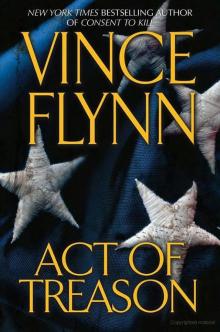 Act of Treason
Act of Treason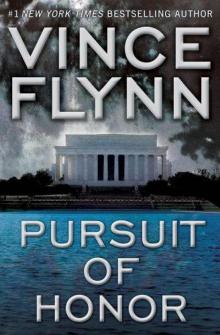 Pursuit of Honor
Pursuit of Honor The Survivor
The Survivor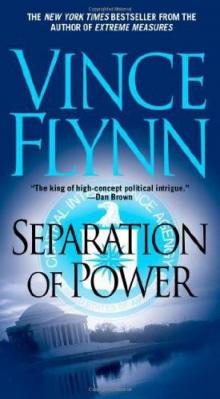 Separation of Power
Separation of Power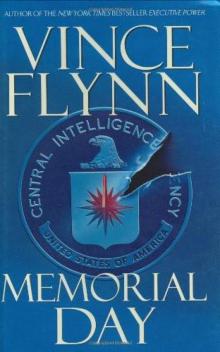 Memorial Day
Memorial Day The Last Man
The Last Man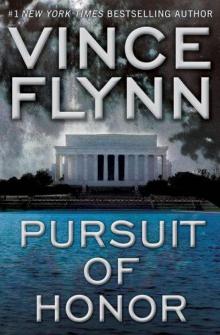 Pursuit of Honor_A Thriller
Pursuit of Honor_A Thriller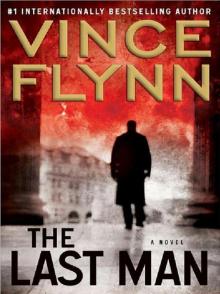 Mitch Rapp 13 - The Last Man
Mitch Rapp 13 - The Last Man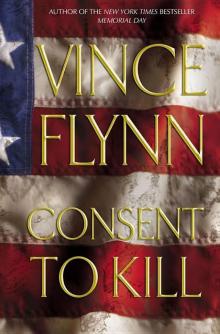 Consent to Kill:
Consent to Kill: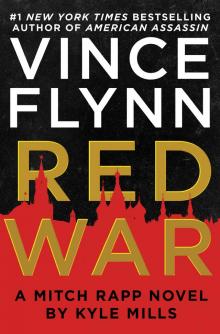 Red War
Red War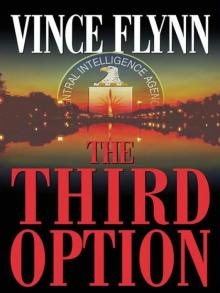 Mitch Rapp 02 - The Third Option
Mitch Rapp 02 - The Third Option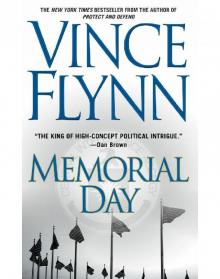 Mitch Rapp 05 - Memorial Day
Mitch Rapp 05 - Memorial Day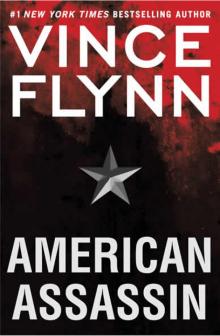 Mitch Rapp 11 - American Assassin
Mitch Rapp 11 - American Assassin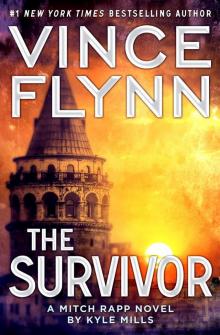 Mitch Rapp 14 - The Survivor
Mitch Rapp 14 - The Survivor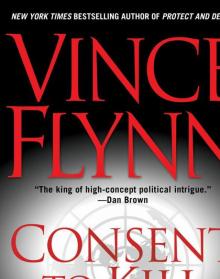 Mitch Rapp 06 - Consent to Kill
Mitch Rapp 06 - Consent to Kill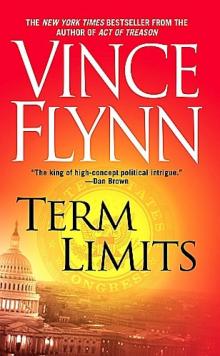 Term Limits mr-1
Term Limits mr-1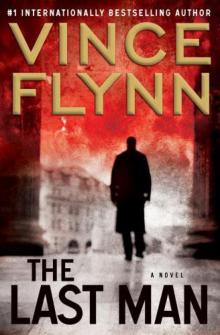 The Last Man mr-13
The Last Man mr-13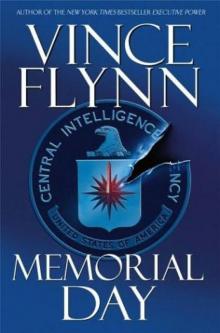 Memorial Day mr-5
Memorial Day mr-5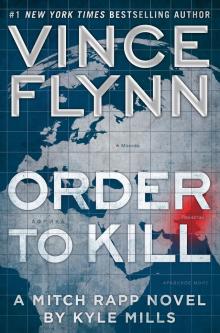 Order to Kill
Order to Kill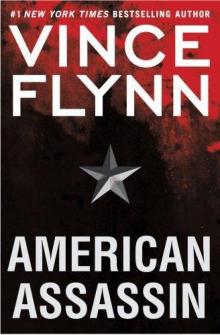 American Assassin: A Thriller
American Assassin: A Thriller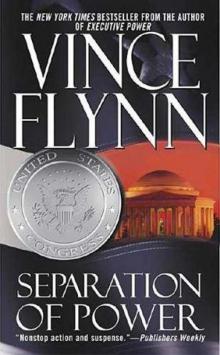 Separation of Power mr-3
Separation of Power mr-3